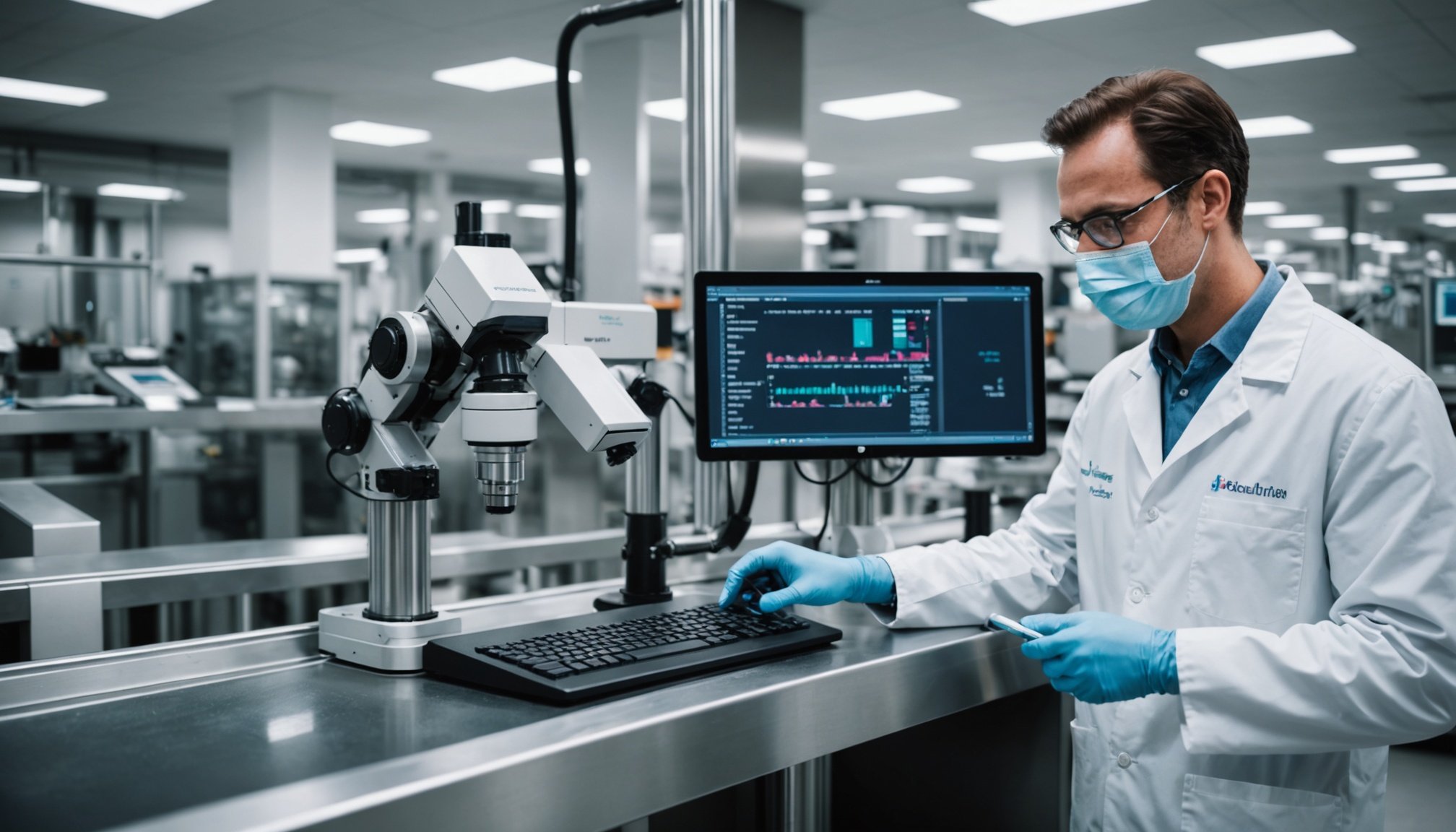Overview of AI Technologies in Pharmaceutical Manufacturing
In recent years, the integration of AI technologies in pharmaceutical manufacturing has ushered in a new era of efficiency and precision. By leveraging machine learning and data analytics, pharmaceutical production is transforming how medications are developed, tested, and produced. AI in pharmaceutical manufacturing optimizes supply chain management, enhances quality control, and minimizes waste by predicting maintenance needs before they arise.
Machine learning algorithms are pivotal in data analytics applications, analyzing vast datasets to identify trends and anomalies that human operators might overlook. This capability is essential for enhancing operational efficiency, allowing for informed decision-making with real-time insights. AI systems can process millions of data points rapidly, ensuring that manufacturing processes remain consistent and compliant with stringent industry standards.
Additional reading : 10 video production agencies that will transform your brand
Moreover, AI technologies contribute significantly to pharmaceutical production by automating routine tasks, thus reducing the room for human error. This automation allows personnel to focus on more strategic tasks, driving greater innovation and productivity within the industry. The combination of AI-driven analytics and automated processes makes pharmaceutical manufacturing more responsive, adaptive, and capable of meeting rising demands for high-quality pharmaceutical products efficiently.
Validation Processes in Pharmaceutical Manufacturing
Validation processes are vital in ensuring pharmaceutical quality control and regulatory compliance. These processes confirm that every aspect of pharmaceutical manufacturing consistently produces results that meet set requirements. Traditional validation methods often face challenges, such as being time-consuming and prone to human error. These methods typically involve rigorous testing and documentation to satisfy industry standards and regulations.
Have you seen this : Top 10 video production companies to elevate your brand identity
Maintaining regulatory compliance is crucial, given the stringent guidelines governing the pharmaceutical sector. Compliance ensures that products are safe and effective, protecting both consumers and manufacturers from potential liabilities. However, these requirements can pose significant challenges, especially when relying on manual validation methods.
To address these challenges, automation and AI technologies are increasingly being integrated into validation processes. Automating these processes reduces the margin for error and enhances efficiency, ensuring quicker delivery of quality products. With AI, manufacturers can streamline operations and uphold compliance, facilitating an adaptive approach to the ever-evolving regulatory landscape. As a result, the industry can overcome traditional validation bottlenecks, paving the way for more robust and reliable pharmaceutical production methods.
Case Studies of AI Implementation
To further understand the impact of AI in pharmaceutical manufacturing, let’s explore real-world AI case studies demonstrating its transformative potential. These pharmaceutical AI applications showcase not only the measurable outcomes but also the lessons learned from AI integration across various facets of production.
Case Study 1: AI in Quality Control
A significant success story involves AI’s role in enhancing quality control. Utilizing machine learning, companies have automated defect detection, resulting in significant reductions in inspection times and error rates. This ensures higher product quality and consistency.
Case Study 2: Streamlining Batch Release
AI’s capabilities have also been leveraged to streamline batch release processes. By integrating AI-driven analytics, pharmaceutical firms have reduced batch release times, enabling faster market access without compromising compliance or quality.
Case Study 3: Predictive Maintenance
Predictive maintenance is another area where AI has proven invaluable. By analyzing equipment data, AI systems predict maintenance needs, preventing unplanned downtime. This not only enhances operational efficiency but also extends equipment lifespan. Each case study illustrates the practical benefits of adopting AI, emphasizing its ability to drive innovation within the pharmaceutical sector.
Benefits of Integrating AI in Validation Processes
Integrating AI technologies in validation processes delivers various benefits of AI that significantly enhance pharmaceutical manufacturing. Primarily, AI contributes to process optimization by automating tedious tasks, reducing the reliance on manual labor. This accelerates validation timelines and minimizes the scope for human error, ensuring consistently high-quality outcomes.
Furthermore, AI enhances data analysis, enabling quicker and more informed decision-making. With AI’s ability to traverse vast arrays of data swiftly, manufacturers can identify potential issues with greater accuracy, leading to timely interventions. This capability not only improves the efficiency of operations but also strengthens pharmaceutical manufacturing advantages, fostering a more agile production environment.
Cost savings are another prominent advantage. By optimizing resource allocation and reducing waste, AI integration lowers operational costs. Companies can reallocate savings towards innovation and development activities, driving further growth and competitiveness. These improvements underscore the transformative potential of AI in validation processes, presenting a compelling case for broader adoption in the industry.
Challenges in AI Integration for Validation
Integrating AI technologies into validation processes in pharmaceutical manufacturing comes with distinct challenges. Firstly, technical and operational barriers need to be addressed. These can range from integrating AI systems with legacy infrastructure to ensuring compatibility with existing manufacturing processes. Overcoming these hurdles often requires significant investment in resources and time.
Additionally, the workforce must possess specialized knowledge to operate and maintain AI-driven systems efficiently. Training programs are essential to equip employees with the necessary skills. This requirement underscores the importance of continuous education to stay abreast of technological advancements.
Data privacy and security raise concerns in AI applications. Pharmaceutical firms handle sensitive information, making robust cybersecurity measures critical. Ensuring data integrity while leveraging AI’s capabilities is a delicate balance.
Furthermore, resistance to change can hinder AI adoption. Organizations must foster a culture of innovation and openness, encouraging teams to embrace the technology. By acknowledging and addressing these challenges, pharmaceutical companies can enhance their readiness for successful AI integration, leading to more robust and reliable validation processes.
Future Trends in AI and Pharmaceutical Manufacturing
The future of AI in pharma promises significant advancements through emerging technologies. With continued innovation, the pharmaceutical industry is poised to witness transformative changes that further enhance pharmaceutical production processes. AI-driven tools are expected to become more sophisticated, streamlining operations, and elevating manufacturing precision.
Emerging technologies in AI, such as advanced machine learning models and quantum computing, are anticipated to revolutionize drug discovery and development. These innovations can process complex datasets at unprecedented speeds, potentially uncovering new therapeutic pathways and optimizing formulation processes.
A more connected ecosystem, facilitated by the Internet of Things (IoT), will further refine AI technologies in pharmaceutical settings. This connectivity enhances data flow across manufacturing stages, enabling real-time monitoring and optimization of each process step.
Predictions for the future landscape also suggest an increased focus on sustainability. AI can play a crucial role in minimizing energy consumption and reducing waste, contributing to eco-friendly manufacturing practices.
Remaining adaptable is key. As innovation trends evolve, staying informed and flexible will ensure that companies capitalize on AI advancements, maintaining competitive advantages while driving industry-wide progress.











